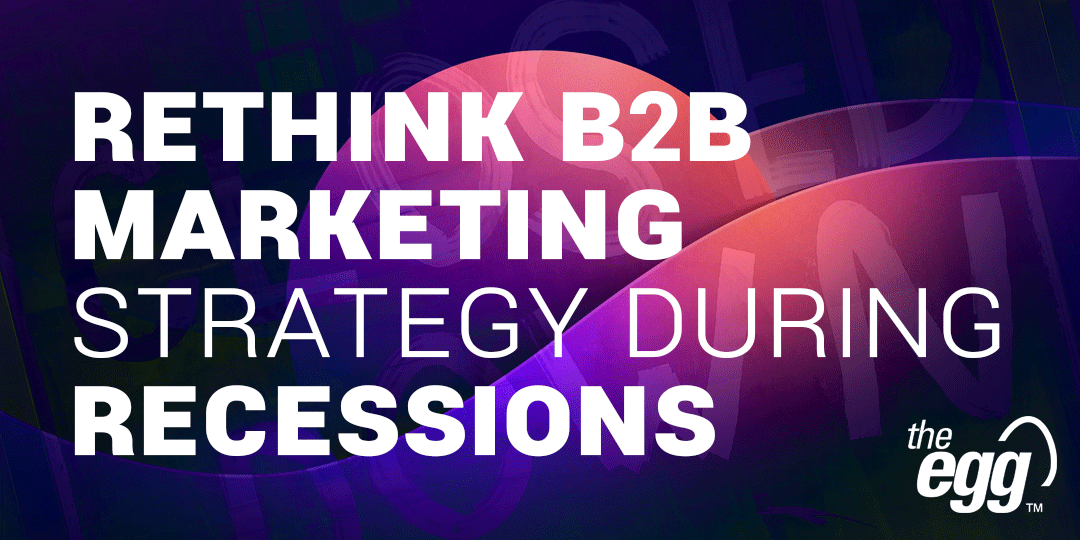How to “Recession-Proof” Your B2B Marketing Strategy
2023 has been a year of global economic turbulence. In the face of rising inflation, slowing economic growth, and elevated global interest rates, it’s natural to feel uncertain about the future of your business. But the next critical steps you take will give you the foundation to survive—and even thrive—as the economy adapts to these new challenges.
Successful B2B marketing during economic downturns demands a careful rethink of how to neutralize its adverse effects on your bottom line. And those companies that fare better tend to be the ones that identify their top priorities early on, streamline their efforts, and execute strategies based on how their industry, sectors in which they sell, and their customers are affected.
This begs the question: How do you figure out what those strategies might be?
Here, discover three tips on how to rethink your B2B marketing strategy to ride the current challenging economic environment and emerge stronger.
Tip #1: Double Down on Value-Based Marketing
Recessions erode the confidence of your customers, whose heightened price sensitivity towards their purchasing decisions will impact marketing effectiveness, especially if your current messaging is heavily feature-based around your product or service.
But by pivoting to value-based content and messaging, recessions are an opportunity to exploit the customer churn and position yourself as the better market alternative, cultivate trust, and win customers from your competitors.
Value-based marketing is as much about how you follow up and nurture customer relationships as it is about how you start them. Proving you can help your customers as part of your marketing demonstrates that you understand their challenges and goals—and this credibility must be built up for them to feel ready to buy.
There are several ways you can lead with value in your marketing.
For instance, interactive calculators that require visitors to input data into a form to get an answer instantly calculated for them are great for increasing engagement and encouraging them to stay on your site longer, which makes it more possible to improve conversions. Convenient for customers seeking quick answers to their problems, interactive calculators are utilized by B2B companies that offer complex products and services but struggle to demystify their offerings on their website.
Data-rich materials and case studies can also help reduce your website bounce rate and offer potential buyers the context and social proof to reassure themselves of their buying decision. Similarly, if they become repeat buyers, they are better positioned to be nurtured into brand advocates, which allows you to leverage word-of-mouth (WOM) marketing to augment your brand and stand out from competitors.
Tip #2: of Your Existing Customers
In a hot market, there’s often a land grab to acquire as many users as possible—but in recessions, the more sustainable path to growth might be to incentivize higher engagement from existing, core users.
A loyal customer base can be one of your most valuable assets during a recession. It’s cheaper, simpler, and more effective to engage more deeply with your existing clientele than trying to acquire new ones, especially if you’re in B2B where your pool of customers might be smaller than those of B2C companies.
For example, Uber often noted it was more time-efficient to encourage drivers (i.e., their business customers) to spend 10% more time on the app—so that more supply can meet demand—than to acquire 10% more drivers from the market. Indeed, the latter option would need a big marketing push and could take weeks or even months for the new drivers to ramp up the same level of engagement.
As such, express gratitude towards your existing clients by keeping in touch through appreciative emails, offering exclusive discounts, and so on. After all, they are the ones who make repeat purchases, retain your services, and best of all, recommend you to other prospects.
Imperatives will also vary for each business and across sectors, so don’t second-guess how the downturn affects your clients’ businesses. Instead, initiate 1-on-1 conversations with them to understand their biggest obstacles, better address their ongoing needs and, if applicable, upsell or cross-sell products to them as part of your regular marketing strategy to increase revenue.
WANT DIGITAL INSIGHTS STRAIGHT TO YOUR INBOX?
Tip #3: Re-Allocate Your Marketing Spend to Efficient Channels
Downturns are an opportunity to evaluate your entire conversion funnel for areas to optimize. But “one size fits all” does not apply here, and cutting costs or curtailing efforts in the wrong places can be counterintuitive if it hinders your ability to drive demand for your products or services.
A good place to start is to review your campaign management by pausing certain campaigns, conducting A/B testing to dig into the data, and identifying those with the highest conversion-intent and ROI. Such channels tend to be search, pay-per-click (PPC) advertising, and email marketing, while the lower-ROI ones tend to be broad targeting—particularly display ads—on large advertising networks.
In any case, it is prudent to ensure each of your methods offer data on cost-per-leads (CPL), conversion rates, and open rates (for email campaigns) so that you can measure their success.
Furthermore, consider the efficacy of your discretionary marketing efforts. For example, review whether your sponsorships and collaborations with KOLs have had a tangible impact on your brand awareness and conversions. In such a case, you might want to track the traffic performance and conversion rates for your collaboration with each blogger to inform your overall strategy.
Ultimately, the challenge is to cut away the fat and not the marketing muscle of your most effective campaigns—after all, marketing efforts take time to develop and deliver results, so when the engine stops, it can take a while for them to get back to speed again.
***
The core marketing principles don’t change during challenging economic climates, but their practical applications do. Hence, having the right strategies in place will make your business less vulnerable to the volatility of the economic environment and help uncover untapped opportunities for you to exploit to one-up your competitors.
Sources:
https://www.wordstream.com/blog/ws/2020/09/24/marketing-during-recession






